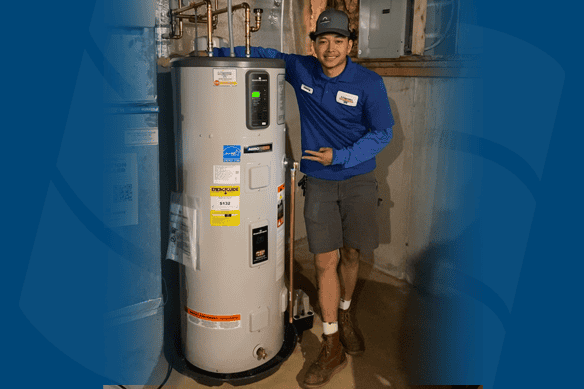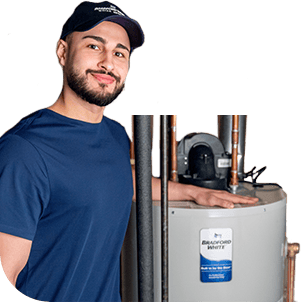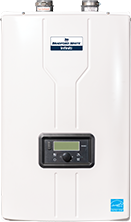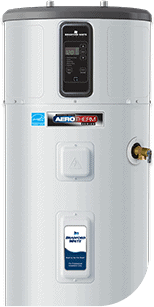Unlocking Home Energy Efficiency: The Heat Pump Water Heater

Like most homeowners, you probably want to find sustainable and cost-saving solutions for your residence. Fortunately, today’s environmental and economic factors are driving demand for new, more energy-efficient technologies that you can use in your home. One such innovation that’s gaining traction is the heat pump water heater (HPWH). This next-gen appliance can significantly reduce energy usage for water heating and help lower your energy bills. But how does this water heater work? What sets it apart from traditional water heaters? And is it the right choice for your home? Keep reading for the answers to these questions.
Understanding the Heat Pump Water Heater
At its core, a heat pump water heater operates on the same principle as a refrigerator, just in reverse. Rather than expending energy to generate heat, it moves existing heat from the air around the water heater to the water in the tank. This transfer of heat is what makes the heat pump water heater so energy-efficient – it uses up to 60% less electricity to heat the water than traditional electric water heaters. That’s two-to three-times more efficient!
While the name “heat pump” might suggest a complex system, in reality, heat pump water heaters are simple to operate. They consist of three main parts: a compressor, an evaporator, and a condenser – components that work together to transfer heat and heat the water in the tank. This process leverages ambient air temperatures to reduce your home’s carbon footprint and energy bills. This system is extremely efficient in warmer climates where the air is naturally warm, but works effectively in colder climates too.
Most heat pump water heaters meet ENERGY STAR® criteria for energy efficiency. Products with the ENERGY STAR® label meet strict efficiency criteria established by the U.S. Environmental Protection Agency (EPA).
Bradford White’s dedication to energy efficiency innovation, education, and promotion has made the company a five-time ENERGY STAR® Partner of the Year (2020, 2021, 2022, 2023 & 2024). Learn more about Bradford White’s ENERGY STAR® certified water heaters here.
Why the Transition to Heat Pump Water Heaters?
You’ll enjoy some big benefits by switching to a heat pump water heater:
- Lower your energy costs. First, because your water heater is the second largest user of energy in your home, the heat pump water heater can dramatically reduce your home’s electrical demand and lower your monthly electric bill.
- Protect our environment. Both electric and heat pump water heaters have virtually zero direct greenhouse gas emissions. By consuming less electricity, heat pump water heaters can help lower greenhouse gas emissions to further protect our environment.
- Help keep your home cool. Your heat pump water heater can dehumidify and cool the space in which they operate, acting as an ambient temperature control during warmer months.
While the upfront costs of a heat pump water heater can be higher than traditional electric water heaters, you’ll enjoy significant savings on your energy bills-perhaps hundreds of dollars a year. Over time, the heat pump water heater can effectively pay for itself (and maybe more!) with the savings it provides.
Even better, rebates and incentives may be available to help lower your upfront cost. Look for local utility rebates or federal tax credits that can offset the initial purchase price of a heat pump water heater.
Choosing the Right Heat Pump Water Heater for You
Before making the switch, it’s important to consider your home’s specific needs. The location within your home where the heat pump water heater will be installed matters, as it needs access to a large volume of air to work effectively. Additionally, the size of the tank should be selected based on the size of your household and typical water usage.
You’ll also want to be mindful of maintenance. HPWHs may require more upkeep than their traditional counterparts, as dust and debris in the air can clog the system over time.
However, regular cleaning and maintenance can ensure the system continues to operate efficiently for years.
A licensed plumber or HVAC professional can help you consider all of these key factors. Need to find a plumbing professional near you? Search here to find a Bradford White professional in your area.
Some heat pump water heaters offer additional features to give you more control and flexibility. For example, Bradford White’s AeroTherm® Series heat pump water heater has five different operational modes so you can get the right combination of performance and efficiency for your needs. The AeroTherm® also offers Bradford White Connect™, which turns your heat pump water heater into a smart, connected appliance that can be easily controlled via mobile app.
Installing Your Heat Pump Water Heater
Your heat pump water heater should be professionally installed, since these units may require changes to your home’s electrical and plumbing systems. Installation costs can vary, but are worth the investment to ensure your water heater operates at peak performance and efficiency for years to come.
Once installed, simply enjoy the hot water your heat pump water heater provides. Heat pump water heaters have a lifespan of about 10-15 years. Overall, the transition can be seamless, and the benefits are tangible, contributing to both a more sustainable home and a healthier bottom line for your household expenses.
The Future with Heat Pump Water Heaters
With the demand for energy-efficient and sustainable solutions growing, heat pump water heaters are poised to play an increasingly significant role in our homes. As technology continues to advance, we can expect even greater efficiencies, reduced costs, and broader adoption of heat pump water heaters across the housing market.
The adoption of heat pump water heaters signals a shift toward smarter, more efficient homes. By making informed choices and staying aware of the latest in home technology, we can all contribute to a more sustainable future.
As a homeowner looking to lower your monthly energy bill and help protect our environment, the heat pump water heater may be a great choice for you. Want to learn more? Check out the advanced AeroTherm® Series Heat Pump Water Heater from Bradford White.



